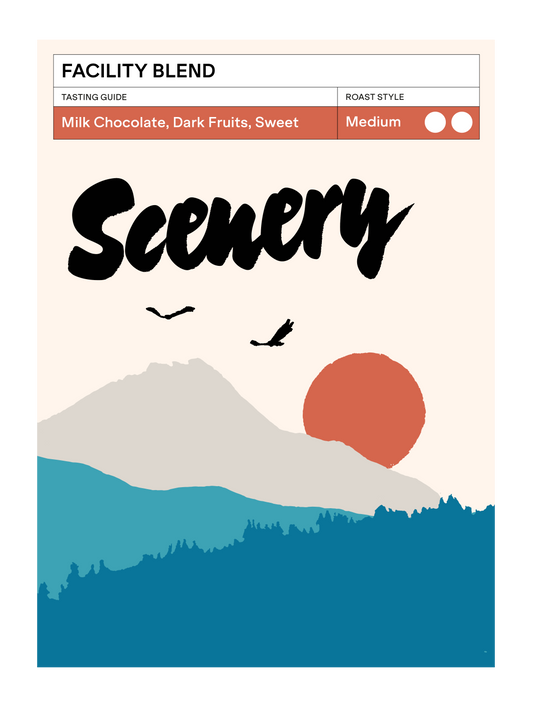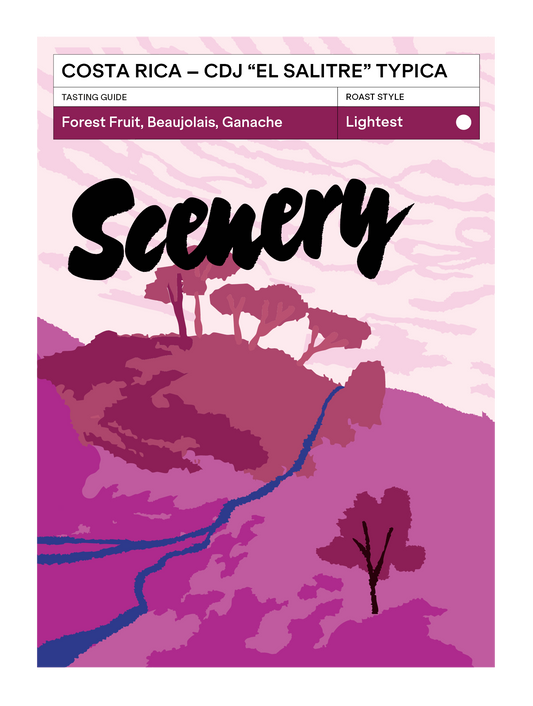This coffee was a sleeper - arriving with zero pre-hyping, this might just be one of the favourite trad-processed (as much as anoxic natural can be said to be trad) coffee's we've dropped yet. Flew out between 12/05/25 to 20/05/25
Jorge “Pikudo” Andrade transitioned to coffee farming after the Venezuelan economic crisis disrupted his fruit business along the border region.
Relocating to Huila, he connected with with Orlando Sanchez, a member of the LaREB collective; who provided him with Rosado and Gesha seeds.
LaREB recognized Pikudo’s exceptional potential - high-altitude (2000 MASL!), good shade management, and careful techniques. We think this Gesha is an absolute stunner, finding it both intensely jammy, floral yet marvellously clean.
Part of our LCF special release series.
Brew Guide:
Best Brewed with: Filter
Lightest Roaster Influence: A super fast roast yet managed to ensure consistent internal bean development, this Gesha is clarity driven and super bright.
Best Rested: 3-4 weeks
Filter: 62g/L & 96°C, with rest we like to move down to 93°C
Espresso: Turbo shots + 3 weeks rest. 18g/48g+ & 20s
We’re tasting: Aromatics of soft strawberry foam sweets, raspberry jam & custard. In the cup - fresh picked ripe raspberry, white chocolate
sweetness, fruity & floral, with a vanilla finish. As it cools, the florals become fresh cut flowers
Traceability
Country of Origin: |
Colombia |
Region: |
Guajira, Palestina, Huila |
Producer: |
Jorge 'Pikudo' Andrade |
Farm: |
Pikudo |
Variety: |
Gesha |
Elevation: |
2000 MASL |
Process: |
Anoxic Natural: Picking very ripe to overripe cherries, with up to 12 hrs in cherry dry fermentation. Cherries then placed in a sealed container and fermented in an anoxic environment for 72 hrs. Dried slowly in parabolic driers over 21 days. |
Import Partner: |
LaREB |
Harvest |
24/25 - Arrived UK: Mar 25 |
The Story
The year 2018 was marked by a significant escalation in the ongoing Colombia-Venezuela border crisis, which was primarily driven by the worsening socio-economic and political situation in Venezuela. This period was characterized by a massive exodus of Venezuelans, with Colombia being the main recipient of this migratory pressure. The crisis had pretty substantial impacts, notably affecting agricultural dynamics in the border regions and altering trade flows.
The 2018 crisis was characterized by several key factors including critical levels of hyperinflation, severe shortages of essential goods, and a contracting economy in Venezuela. The controversial re-election of Nicolás Maduro in May 2018 further entrenched the political crisis, compelling more Venezuelans to leave. Consequently, Colombia became the primary destination for a large wave of Venezuelan migrants and refugees, straining humanitarian aid capacities and public services, particularly in border departments. In response, stricter border controls and registration processes were, at times, implemented by Colombian authorities.
The border crisis of 2018 marked a turning point for Jorge Andrade. After decades as a successful stone fruit and apple grower, the sudden collapse in cross-border trade left him without a market. With his livelihood suddenly threatened, Jorge began searching for alternatives, and coffee presented an unexpected opportunity. Having upped sticks from the border, Jorge purchased a plot of land in Palestina, Huila (peak coffee growing region) - and a key hub for the LaREB producers
Orlando Sánchez, a major part of the LaREB collective, offered crucial support to Jorge by providing Rosado and Gesha seeds from his own farm. While waiting for his coffee plants to mature, Jorge and his family grew corn, beans, potatoes, and other transitional crops suitable for high tropical forests. With high altitude and good seedstock, Jorge was on the way up - but coming back from the ropes left him another issue. Unable to afford a de-pulper (a machine that removes the seeds from the coffee cherry, a crucial piece of kit for producing washed/honey process coffees) - his only option was to dry his first harvest as a natural (dry) process.
Despite successfully growing quality coffee, Jorge faced another hurdle: Colombia's extensive network of commercial buying stations typically refuses dry processed coffee, accepting only thoroughly washed beans (a holdover from an era where any fruit character was seen as a defect, one still seen in todays commercial buying teams).
Once again, Orlando intervened at a critical moment, introducing LaREB's buying team to Jorge's distinctive coffees. An instant addition to the LaREB line-up, by achieving speciality export income as well as the continual feedback loop that comes from the excellent work of Herbert and others - Jorge’s coffee has gotten better and better with each harvest. Now several years in, we were absolutely blown away at the cupping table by this harvest - it was an instant buy, and as our first test roasts rest out further - we think this might be one of our favourite “classic “ processed lots we’ve launched - ever.
LaREB:
LaREB- La Real Expedición Botánica - are a radical producer-owned export co-operative/movement. Their goal is to develop de-colonised supply chains and operate outside the typical multinational pathways of coffee, and it’s a mission that’s really resonated with us. By pooling together collective knowledge, financing, quality, export and import, LaReb members are able to define their own terms of engagement. It’s genuinely so refreshing to work with Herbert and the team, and we know we’ll only to continue to grow our purchasing relationship over the years.
CDNT emerged from eight producers in northern Tolima who chose to build their own response to falling incomes and youth migration from coffee farming. Using Herbert Peñaloza's 575 farm as their base, they've established a practical blueprint for producer-driven change: a shared quality lab, new variety trials, and an agroforestry system for soil improvement. Processing happens independently on each farm, with members directing their own production while pooling resources and expertise.

![[61] Colombia - Pikudo Gesha [CROP 24/25 ARCHIVE]](http://scenery.coffee/cdn/shop/articles/colombia_pikudo_gesha_shopify_b7b435e0-cb7d-419b-b9f7-be8230d99cc6.png?v=1750759836&width=1100)
![Colombia - Quebraditas Ají Thermal Shock Washed [FESTIVE SPECIAL] 🎄](http://scenery.coffee/cdn/shop/files/colombia_quebraditas_aji_shopify.png?v=1764358600&width=533)






![Colombia - Quebraditas Sidra Thermal Shock Washed [25/26]](http://scenery.coffee/cdn/shop/files/colombia_quebraditas_sidra_2526_shopify.png?v=1765544630&width=533)



![Colombia - Luz Ángela's Chiroso [25/26]](http://scenery.coffee/cdn/shop/files/colombia_luz_angela_chiroso_2526_shopify.png?v=1764359755&width=533)


![Colombia - El Jaragual Rosado [25/26]](http://scenery.coffee/cdn/shop/files/el_jaragual_rosado_2526.png?v=1757075842&width=533)